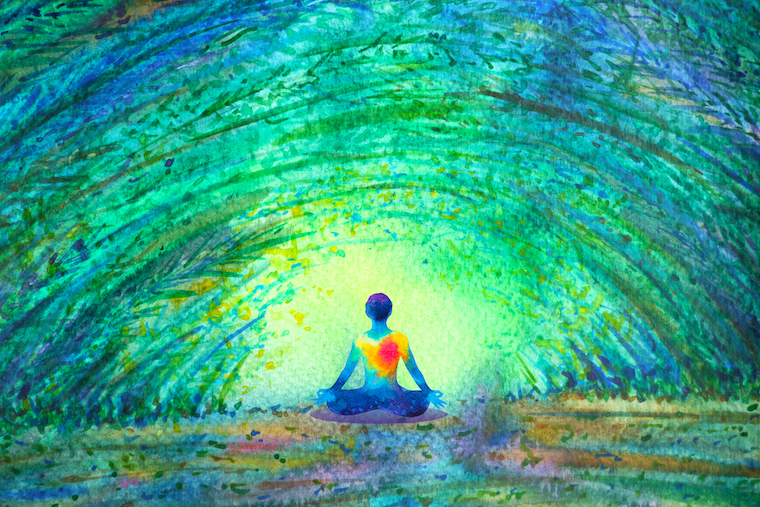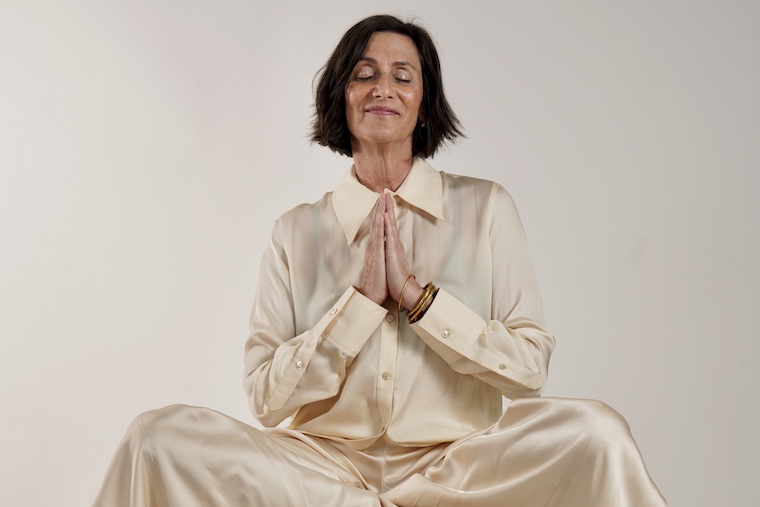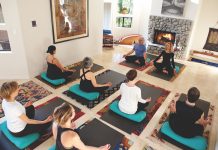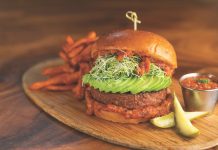
Find inner peace by taking control of your mental and physical well-being with these tips from local experts.
By Elizabeth Nutt
The past year has marked what has undoubtedly been one of the most challenging and anxiety-inducing times in most people’s lives. The COVID-19 pandemic has, to date, taken more than 400,000 American lives; led to economic strife, overburdened hospitals and health care workers; and has changed nearly every aspect of our daily routines.
While the effects of the past 12 months are evidenced in countless ways in Laguna Beach, from shuttered restaurants to reduced tourist traffic and deserted art festival grounds, the emotional toll among community members has been profound, too. Local health and wellness experts are sounding the alarm that people are experiencing unprecedented mental and physical suffering because of increased stress levels, and it’s affecting everything from sleep and mood to our relationships and our waistlines.
The Stress Effect
The age-old human reaction to stress is the “fight or flight” response, or the body’s way of showing us through physiological reactions and hormonal responses that we’re in danger. Put simply, when the brain perceives stress or a threat, it activates the sympathetic nervous system by signaling to the adrenal glands, which produce adrenaline to supply a burst of energy to the body. That’s when the body begins to experience the effects of stress, which include rapid breathing, increased heart rate, heightened senses and blood sugar spikes. These responses are all meant to help the body deal with the threat at hand, but chronic stress can lead to serious health problems.
According to Dr. Tracy Darling, a general practitioner who is passionate about holistic health, the effects of elevated stress levels are serious. “Most people are in fear mode right now,” Darling says of the implications of the COVID-19 pandemic for many of her patients, who have been facing significant financial, emotional and health troubles. “Stress wreaks havoc on your immune system,” Darling says. She explains that cortisol, produced by the adrenal glands, regulates inflammation and gives the body a boost of energy during “fight or flight” situations, but can also suppress the immune system.
To keep the immune system strong, she says, keeping stress levels down is key as well as eating a healthy diet and getting plenty of sleep. Notably, chronic stress can lead to or exacerbate high blood pressure, heart disease and diabetes, among other conditions.
Laura Rivas, a licensed marriage and family therapist with a private practice in Laguna, describes increased anxiety, depression, feelings of isolation, relationship issues and poor quality sleep as among the more acute symptoms of stress this year for many of her clients. “The body keeps score,” Rivas says, meaning that the effects of the uncertainty associated with the pandemic and prolonged stress have made it difficult for many individuals to rebound, quiet the mind and calm the sympathetic nervous system.
“Stress is so correlated with disease. Dis-ease is disease. When we live in a constant state of stress, our body struggles with healing, resting and digesting. Stress hormones surge through our body and wear us down,” Rivas explains. “… The stakes are high and we can’t afford not to make stress management a priority.”

Mind Over Matter
Fortunately, while we have no control over the body’s response to stress, we can create an environment that’s more conducive to feelings of calm than chaos. For Rivas, it’s all about mindset. “In this situation that we’re in [with COVID-19], we have to focus on what we can do rather than what we cannot do,” she says. “… It helps to realize that we did not cause this situation and cannot control it, so letting go a bit and focusing on the happiness we can find in each day is imperative. It is not what happens to us, it is what we do with it that matters the most,” she says. For example, instead of longing for the restaurant experience, try creating a special meal at home and enjoying it with candlelight and music playing as a mood-boosting substitution.
Focusing on what you have and what brings you joy goes a long way. Starting a gratitude journal or practice where you simply reflect on what you’re grateful for goes a long way, Rivas says. “Feelings of gratitude can actually help the brain relax,” she says. It helps you move from the stressed sympathetic nervous system to the more relaxed parasympathetic nervous system, which is rest and digest, which helps you turn down the noise in your head and sleep better.” Rivas is also a firm believer in beginning each day with a simple grounding ritual—something that you can do daily for even just a few minutes, like yoga, stretching or meditation—to feel more calm, happy and centered.
“It is a great time to develop practices of self care now, and meditation is something you can do anytime, anywhere with scientifically based benefits,” echoes Lori Kahn, a certified mindfulness and meditation teacher, yoga instructor and owner of the OM yoga & meditation studio in Laguna Beach. “… Breathing is everything when it comes to feeling balanced and calm. There is also evidence-based research that deep, focused breathing and prolonged focus on the natural flow of breath slows the heart rate, reduces blood pressure and stimulates the immune response,” Kahn adds. In other words, meditation may be one of the best antidotes to the stress response.
To incorporate a meditation practice at home, Kahn suggests simply finding a time and place in your home where you can sit comfortably. “Start small and make it work for you,” she says. “… Just set aside a few minutes every day, preferably when you wake up in the morning.” Kahn says to take three deep, slow breaths, and then follow your natural flow of breath for a few breaths up to a few minutes. “Meditation primarily is a practice of focusing on the breath. … When your thoughts pop up—they always do—you simply return your attention to the breath in and out,” Kahn says, emphasizing that the practice triggers a relaxation response in the brain.

Get Busy
In addition to trying to maintain a positive mindset, finding ways to stay occupied—with daily routines and rituals, for example—is more important than ever when it comes to beating stress because these create a sense of purpose and normality. “I always ask my patients, ‘What do you have to look forward to this week?’ ” Rivas says. And it doesn’t have to be complicated: Some of the greatest bolsters of happiness include exercise and time spent outdoors. “Nature can be so healing and exercise can be medicine,” Rivas says of the power of a simple walk on the beach or a hike.
Darling echoes this idea: After researching the many benefits of having a creative outlet, for example, Darling and her husband, who also runs her medical office, purchased art supplies and took up painting during quarantine. And, as a medical practitioner, Darling understands the benefits of exercise when it comes to reducing stress. “We just had to decide, ‘Are we going to let this beat us?’ And we did the things we could do. We had some weights at home so we started to lift weights and take a 3- or 4-mile walk every day,” she says.
Meanwhile, a new hobby can quell feelings of boredom and malaise, focusing your mind on a new task or creation. Rivas points to YouTube as mecca for free classes for everyone covering nearly every topic—from cooking to knitting and yoga—for some at-home inspiration. “If you don’t have it, create it,” she says of finding space to bring joy and satisfaction into your life each day.
Perhaps the most important activity to keep on the calendar is communicating and connecting with family, friends and neighbors however you can. “Connecting with others is very important: Making eye contact [and] sharing our thoughts creates a sense of ‘I am not alone,’ Rivas says. “Social engagement calms or down-regulates the sympathetic nervous system stress response, according to the polyvagal theory, which helps us feel connected. Zoom and Facetime can be very helpful tools.”

Nourish and Nurture
In addition to making changes to your mindset and daily habits, reflecting on what you’re putting into your body during tough times is critical. “The immediate reaction to stress is that your heart is racing, you’re sweating, you’re experiencing that fight or flight reaction and, when that happens, of course, you tend to not think as rationally or critically as you could,” Darling says. “That’s when bad decisions get made. That’s when we start craving sugar or carbs.” But consuming extra sugar can be harmful if the body’s blood sugar is already spiking because stress is causing instability in the adrenal glands.
According to Darling, that’s one of the factors that has played into the weight-gain trend among her patients this year—others being increased takeout from restaurants and alcohol consumption, as well as halted workout routines. The first step to better health is trying to cook at home more often, stocking the fridge with the healthiest possible items: green vegetables like broccoli, spinach, asparagus and leafy greens; quality protein such as wild-caught fish and organic meat; healthy fats like raw nuts and seeds; and healthy oils like avocado or grape seed, all of which will help you eat a diet rich in vitamins and nutrients and boost immunity.
As for things to avoid, Darling suggests reducing or cutting caffeine, which stimulates the adrenal glands even more as well as increases stomach acid and blood pressure, and could cause more anxiety and sleep disturbances. “And bag the sugar,” Darling says of sweets, which are also a stimulant, can lead to a crash in energy and subsequently more sugar cravings. Finally, she recommends trying to avoid or limit alcohol intake. “Alcohol is technically a sugar … [and is known for] increasing estrogen in fat cells, which increases fat production,” she says. In other words, alcohol can lead to weight gain—not to mention impaired judgment when it comes to making healthy choices at dinnertime.
When it comes to supplements and herbs, Darling also recommends taking vitamin D supplements. She suggests getting your blood tested to find out if you are deficient in vitamin D, or take up to 10,000 IUs of vitamin D per day. Studies show vitamin D may have antiviral effects while vitamin D deficiency is linked to depression and a host of other conditions. And, as an alternative to medication, Darling suggests over-the-counter ashwagandha, “an adrenal-calming herb” that helps ease stress and anxiety by lowering cortisol levels in the body.
With a focus on what you can control, whether it’s the food you’re eating or the thoughts you’re thinking, it is possible to make small tweaks in your daily habits in order to boost overall happiness and to stress less this year and beyond.




